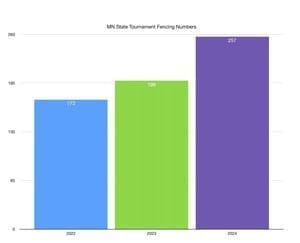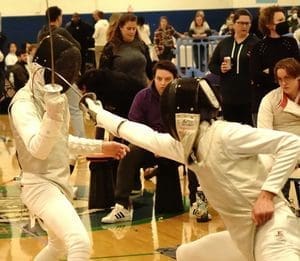Three Keys to Fencing Success
To read the article.
To skim article.
To read the article.
To skim article.

Fencing is a fast, fun, and competitive Olympic sport and it’s growing in popularity! The Minnesota state fencing tournament has grown by 47% in three seasons. Growing from 175 fencers in 2022 to 257 in 2024. Without a doubt, fencing is growing as a sport and young fencers want to know how to become successful fencers. At YEL Fencing Club (YEL FC), we believe there are three keys to fencing success: practice, private lessons, and tournaments.
Students might enjoy one of these elements more than others. However, good coaches and successful fencers know only by working hard at all three keys of fencing success can a fencer reach their full potential.
Your child may have seen Lee Keifer win the Gold Medal at the 2024 Paris Olympics, or be a huge fan of Star Wars light saber duals. Whatever primed your child’s interest, you decided to look for ways to introduce your child-athlete to the unique sport of fencing. Like your child, most fencers start their fencing journey by looking for a local class or a club to be introduced to fencing. You might find classes through a local fencing club, a community education class, or a parks and recreation summer camp (check back in the Feb. 2025 for summer camp information). However you find the class or club, “practice” is the first key of fencing success. It’s where beginner fencers learn the basics, and experienced fencers keep their skills sharp. Practice is also the place where fencing athletes can create friendships and become a part of a fencing team. At YEL FC, we receive a lot of comments from fencers saying that they “found their sport”, or they “never knew they were athletic until they found fencing”.
Any fencing class worth its salt will include a variety of activities designed to increase the athlete’s acumen, strength, stamina, and dexterity. A lot of the time spent in fencing class will focus on fencing footwork, drills, and other basics. But that doesn’t mean it has to be boring! Nay! Never utter such a word about practice.
At any given YEL FC practice, you’ll see our innovative coaches pull out tennis balls, jump ropes, and fencing foils (the more elegant swords used in fencing). They may even be putting a smile on athletes’ faces while trying a novel way to get them to do push-ups or run laps. Yes, it has been done!
This “smile while you sweat” approach isn’t all we do during practice! At YEL FC, we teach all aspects of the sport so that our fencers become what we call ” knowers. “Knowers” know how to referee, care for equipment, and coach teammates during tournament matches.
Our club also focuses on a welcoming vibe where athletes cultivate friendships, discuss common interests (Dungeon and Dragons, anyone?), and even make new friends. Although class time should be focused on training, athletes do find time to get to know other fencers in the club.
Fencing practice is a fun and important key to fencing success. But wait, there’s more.

Face it…fencing is cool!
YEL FC coaches are dedicated, hard-working, and innovative. But even the expert coaches, Head Coach Paddy Murphy and Head Coach Jacob Mickelson, can’t catch and refine all fencer techniques during a group practice. The solution is the second key to fencing success…private lessons. During a private lesson, our coach’s attention is entirely on the individual fencer. These 20-minute lessons are crafted by Coach Paddy and Coach Jacob, who spend hours outside of practice discussing each fencer’s unique needs and designing private lessons that build the fencer into an elite athlete.
Private lessons expand and improve the basics learned in practice. Generally speaking, individual lessons are where fencers are introduced to advanced concepts, bout strategies, and more of Coach Paddy’s and Coach Jacob’s secret recipes for success.
No fencer’s training is complete without the pressure and fun of the third key of fencing success…tournament competition. All the skills they’ve learned at practice and refined in individual lessons are tested at fencing tournaments. On the fencing strip (the field of play for a fencing match), facing an opponent is the only place to find out what you’ve truly mastered and still have to work on.
For many fencers, the next fencing tournament is the whole point! They fence to compete and see how their skills measure up. I mean, let’s face it: you can only fence your club teammates so many times before you need to find a new challenge. Tournaments are the place to find that challenge! You’ll face a variety of new opponents that test you in new ways, so you can keep learning. Facing the pressure of competition is also essential in improving your skills.
Imagine facing that pressure while standing on the fencing strip. It’s 14-14, and the first fencer to get to 15 wins. What have you learned from practice, private lessons, and during the

Teammates cheer you on!
tournament to give you an edge and help you notch this victory? It all comes together right here, where you need it most. You parry, riposte, score, and WIN! Your YEL FC teammates cheer you on with thunderous applause and shouts of “Way to go!”
While the pressure of competition can sharpen your skills, many beginner and veteran fencers find tournaments intimidating. The competitive atmosphere can seem unwelcoming, even though the other fencers are usually pretty friendly.
The best way to overcome those competitive nerves is in the company of your coach and club teammates. They’ll be by your side as you step onto the fencing strip, encouraging you with every advance and lunge. Your coach can also help you manage some of the other parts of competing, which may be less dramatic but equally intimidating. For example, they can help you manage logistics, like signing up for a membership on the USA Fencing website or finding the next tournament on AskFred.
Perhaps most importantly, competition is where athletes learn some of the most important lessons they’ll apply throughout their lives, like good sportsmanship, patience, and respect. No one wins every time, but that doesn’t mean you can’t have a good time. Regardless of the outcome, it’s part of the fencing tradition to be gracious in victory and defeat.
Fencing is a unique sport in that athletes rarely “ride the pine” or “ride the bench.” Practices are all-inclusive, meaning everyone is active and engaged the entire time. Most local, state, and regional tournaments are open to all fencers with no required qualification process. Your young athlete will keep moving and keeping fit throughout their time in fencing and won’t be bored “riding the pine.” That term doesn’t even exist in fencing.
YEL Fencing Club produces champion fencers, but that’s only one part of what we do. By participating in all three keys to becoming a successful fencer, athletes get an outstanding fencing experience while also having a lot of fun. Come and check out our club. You should immediately feel welcome, enjoy the vibe, and get a sense of the camaraderie of our Head Coaches, Paddy Murphy and Jacob Mickelson. They work hard to foster an environment of camaraderie, helping fencers feel at home, enjoy this fantastic sport, and leave each practice, private lesson, and tournament one step closer to their fencing success.
Do you want to learn more about YEL Fencing Club and how your young athlete can participate? Please get in contact today and take the first step on their fencing journey.
We'd love to meet you! Fill out the form below and we'll schedule a time to talk and take a tour of the YEL Fencing Club facility.
 Fencing Practice is a key to fencing success
Fencing Practice is a key to fencing success
https://shorturl.fm/8rOj9
https://shorturl.fm/6XjlO
https://shorturl.fm/igplp